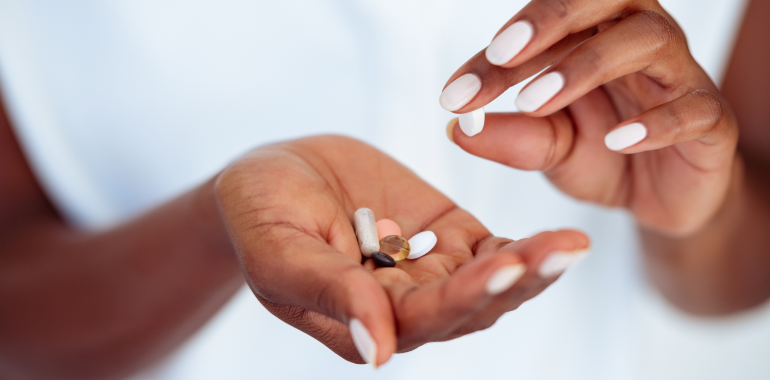Table Of Contents
Can You Take Supplements While Fasting – Answer From Experts
Whether or not you can take supplements while fasting depends on the type of supplement and the type of fasting you are doing. Here are some expert guidelines:
- Water fasting
Avoiding supplements, including vitamins, minerals, and herbs, is generally recommended during water fasting. This is because supplements can stimulate digestive processes and may interfere with fasting.
- Time-restricted eating
If you are doing time-restricted eating, such as 16:8 intermittent fasting, you can take certain supplements during your eating window. However, check with your healthcare provider before taking any supplements.
- Supplements for weight loss
Some supplements, such as green tea extract, caffeine, and conjugated linoleic acid (CLA), have aided in weight loss. However, it’s important to check with your healthcare provider before taking any weight loss supplements, especially if you are fasting.
- Multivitamins
While avoiding supplements during water fasting is generally recommended, taking a multivitamin before a fast may help prevent a nutrient deficit. Check with your healthcare provider before taking a is an essential supplement.
In summary, while some supplements may be safe to take during intermittent fasting, you must check with your healthcare provider before taking any supplements, especially during water fasting. Also, remember to remember that supplements should not be relied upon as a replacement for a healthy, balanced diet.

Can You Take Medicine While Fasting: What Are the Benefits
Whether or not you can take medicine while fasting depends on the type of medication and the type of fasting you are doing. However, here are some general guidelines.
There are several benefits to taking medication while fasting:
Improved absorption
Some medications are better absorbed on an empty stomach, so taking them while fasting is often recommended. When you take medicines on an empty stomach, less food in your digestion means the medication can be absorbed more quickly and effectively.
This is particularly true for medications that can be affected by food or other substances in the digestive system, such as antibiotics or some types of pain relief medication.
Better compliance
Taking medication while fasting can help establish a routine and ensure you don’t forget to take your medicine. Taking your medication simultaneously every day while fasting can become part of your routine, making it less likely that you’ll forget to take your medicine.
This can be particularly important if you take medication that must be taken each day simultaneously for maximum effectiveness, such as medication for high blood pressure or diabetes.
Improved focus
Fasting can help improve mental clarity and focus, which can be especially beneficial if you take medication requiring concentration. Do pills break a fast? When you’re fasting, your body is not focusing on digestion, which can lead to mental clarity and increased focus. This can be particularly beneficial if you’re taking medication that requires you to be alert, such as medication for attention deficit hyperactivity disorder (ADHD) or medication for narcolepsy.
Improved insulin sensitivity
Fasting can help improve insulin sensitivity, which can be beneficial if you are taking medication for diabetes. When you fast, your body becomes more sensitive to insulin, which means that your body can use insulin more effectively to regulate blood sugar levels. This can be particularly beneficial for people with type 2 diabetes, who may have insulin resistance, as improved insulin sensitivity can help them better manage their blood sugar levels.
Improved medication efficacy
Some medications, such as antibiotics, work best when taken on an empty stomach. Taking them while fasting can help ensure they are correctly absorbed and effective. When you take medication on an empty stomach, the drug can be absorbed more quickly and effectively.
This is particularly important for antibiotics affect interfere with their absorption and effectiveness. If you are taking antibiotics, it’s important to always check with your healthcare provider or pharmacist about whether or not you should take them while fasting, as the timing and dosage of the medication may need to be adjusted to ensure maximum effectiveness and safety.
Avoiding medication interactions
Intermittent fasting and taking medication can interact with certain foods and affect their absorption or effectiveness. For example, taking some pills with calcium-rich foods or supplements can reduce their absorption. Taking medication while fasting can avoid these interactions and ensure the medicine is absorbed correctly and effectively.
Reduced side effects
Taking the medication on an empty stomach can help reduce the likelihood of experiencing specific side effects, such as nausea. Some medicines can cause stomach upset or gastrointestinal discomfort, and taking them with food can exacerbate these side effects.
Taking the medication on an empty stomach can minimize the likelihood of experiencing these side effects, as there is less food in your digestive system to interact with the medication.
Consistency
Taking medication while fasting can help establish a consistent routine, benefiting overall health and well-being. Establishing a routine for taking medication ensures that you never miss a dose and that the drug is taken at the optimal time for maximum effectiveness. Additionally, establishing a routine for fasting can help regulate your body’s metabolism and promote overall health and well-being.
Also, read – Can You Drink Tea While Fasting
Can You Take Vitamins While Fasting & How to Find the Right Timing
Fasting is a great way to reset the body’s nutritional balance and support overall health. Still, it’s also important to be mindful of your supplement regimen. Taking vitamins during fasting has become popular recently, but many factors must be considered.
For instance, some vitamins don’t work as effectively without food, while others may do more harm than good if taken while fasting.
Finding the right timing for taking vitamins while fasting can be tricky, as some vitamins require food to be effective. Taking their vitamins too early could hamper their fast; however, waiting too long afterward could render them ineffective.
- In general, it may be best to take any vitamins before starting a fast and right after ending it; this way, one can benefit from all their health-promoting properties without compromising the success of a fast.
Additionally, constantly checking with a medical professional before making any dietary changes can help ensure safe supplementation during a pre-arranged fasting period.
Will Vitamin C Break a Fast?
There is much debate surrounding whether vitamin C will break a fast or not. A quick literature review indicates that supplementing with vitamin C while fasting is safe and should not interrupt your results.
Vitamin C should not be taken in large doses as it may cause digestive distress. However, modest supplementation should be acceptable. Many assume that vitamin C can produce an insulin response, which may break a fast; however, scientific evidence does not support this theory.
Overall, consider incorporating vitamins into your fasting practice. In that case, you can safely add gentle amounts of vitamin C throughout your day without worrying about breaking your fast.
Understanding How Different Types of Medication Can Affect Your Fast
Does medication break a fast? Different types of medication can affect your fast in different ways. Here are some general guidelines for understanding how medication can affect your fast:
- Prescription medications can have other effects on your fast, depending on the drug and the instructions from your healthcare provider. Some medicines may need to be taken with food, which could disrupt your fast. If you take prescription medication, you must talk to your healthcare provider to determine your medicine while fasting.
- Over-the-counter medication, such as pain relievers or antihistamines, can be taken while fasting as long as they are born with water and not food. It’s essential to check the medication’s label to ensure it contains no calories or other ingredients that could break your fast.
- Herbal supplements can affect your fast, depending on the addendum. Some accessories, such as green tea extract or caffeine, can help boost metabolism and weight loss. However, checking with your healthcare provider before taking herbal supplements while fasting is essential.
- Vitamins and minerals can be taken while you are eating time-restricted. However, avoiding taking them during water fasting is critical, as they can interfere with the fasting state.
- Suppose you have diabetes and are taking insulin or other diabetes medication. In that case, it’s essential to work with your healthcare provider to adjust your medication regimen during fasting to avoid any adverse effects on your blood sugar levels.
Does Aspirin Break Intermittent Fasting?
If you are fasting intermittently, there’s much to consider about breaking it. For example, aspirin is a medication that some people take for preventative health reasons, but its use during intermittent fasting can be more complicated than expected.
While aspirin does not break the fast, research shows that it may affect glucose levels and insulin sensitivity, adversely impacting intermittent fasting effectiveness. Therefore, certain professionals suggest caution when taking aspirin during an intermittent fast.
Also, read – Does Brushing Teeth Break Fast
Taking Antibiotics While Intermittent Fasting: Is It Safe?
Suppose you need to take antibiotics while intermittent fasting. It is generally considered safe. Antibiotics are used to treat bacterial infections and do not contain any calories or sugar, so they should not interfere with your fasting schedule.
However, it’s important to follow your healthcare provider’s instructions regarding the timing of your medication. For example, somatic must be taken with food to optimize absorption, while others can be taken on an empty stomach. If you are unsure about antibiotic timing antibiotics, ask your healthcare provider.
In addition, if you are taking antibiotics for a medical condition, it’s important to discuss your fasting schedule with your healthcare provider to ensure that it will not interfere with the effectiveness of your medication or your ability to heal.
Taking antibiotics while intermittent fasting is generally considered safe, but following your healthcare provider’s instructions and discussing your concerns with them is crucial.
Does Paracetamol Break Intermittent Fasting? What You Need to Know
Paracetamol is a common drug used worldwide for its analgesic and antipyretic effects. It’s metabolized in the liver, where the enzyme cytochrome P-450 breaks it down into a toxic metabolite. This process doesn’t seem to be affected by caloric intake or physical activity, which are two factors that can affect the body’s state during fasting.
Intermittent fasting is a dietary practice where you alternate between periods of eating and fasting. During the fasting period, the body undergoes several metabolic changes to adapt to the lack of food intake. The goal is to shift the body’s energy from glucose (derived from food) to stored fat, leading to shedding pounds and others.
- The main concern with taking medication during fasting is whether it will disrupt the metabolic state induced by fasting. Since the metabolism of paracetamol doesn’t depend on caloric intake, it should not interfere with the metabolic changes during fasting.
Caution! Some people may experience side effects from taking paracetamol on an empty stomach, such as stomach upset or discomfort. If you are planning to take paracetamol while fasting, it is recommended to do so under the guidance of a healthcare professional.
Does Tylenol Break a Fast?
Tylenol (acetaminophen) is commonly used for pain relief and fever reduction. In general, taking Tylenol does not break a fast.
Tylenol is metabolized in the liver and is not known to stimulate insulin secretion or interfere with the fasting state. It also does not contain any calories, which means it won’t cause a significant increase in blood sugar or insulin levels.
However, remember that some forms of Tylenol may contain fillers or coatings containing calories or sugar. It’s essential to check the label of any medication you take to ensure that it has no ingredients that could break your fast.
Suppose you are fasting for a medical reason or under the supervision of a healthcare provider. In that case, it’s important to check with them before taking any medication, including Tylenol, to ensure it is safe while fasting.

Does Ibuprofen Break a Fast?
Ibuprofen is a medication commonly used for pain relief and inflammation reduction. Like Tylenol (acetaminophen), ibuprofen contains no calories and is metabolized in the liver. As a result, taking ibuprofen in standard doses is unlikely to break a fast or interfere with the metabolic state of fasting.
However, some forms of ibuprofen, such as liquid suspensions or chewable tablets, may contain sugars or other fillers that could break a fast. Will ibuprofen break my fast? It’s important to check the label of any medication you take to ensure that it has no ingredients that could damage your fast.
In addition, it’s worth noting that taking ibuprofen on an empty stomach can sometimes cause stomach irritation or ulcers. Suppose you have a history of stomach problems or are fasting for medical reasons. In that case, talking to your healthcare provider before taking ibuprofen or other fasting medication is important.
Phentermine and Fasting: Is It Safe?
Phentermine, a prescription drug generally used for weight loss, is often combined with fasting to achieve substantial weight-loss goals quickly. Lately, this practice has been met with controversy over potential negative impacts on the body if not monitored and managed carefully.
Before attempting any combination of fasts and phentermine, it is best to consult a physician to evaluate safety risks and explore options better suited for achieving desired health outcomes.
Then, working together, both patient and doctor can create a plan that fits the individual’s needs while ensuring they effectively take steps towards better health.
Also, read – How Many Calories to Eat During Intermittent Fasting
Tips & Tricks for Taking Medication While Fasting
Here are some tips and tricks for intermittent fasting and taking medication:
- Check the label. Check the title of your medication to ensure it doesn’t contain any calories or sugar. If you are unsure, check with your healthcare provider or pharmacist.
- Talk to your healthcare provider. Talk to your healthcare provider if you have concerns about taking medication while fasting. They can help you determine the best timing and dosing for your prescription.
- Take medications with water. Taking your medicine with a glass of water can help prevent dehydration and ensure the drug is absorbed correctly.
- Choose the right time to take your medication. Deppillthe medication, it may be best to take it at a specific time of day or with food. Talk to your healthcare provider to determine the best timing for your medication.
- Use a pill organizer. A pill organizer can help you keep track of your medications and ensure you take them at the right time.
- Consider liquid medications. If you have trouble swallowing pills, liquid medications may be an option. Check the label to ensure the liquid medication contains no calories or sugar.
- Don’t crush or break pills. Crushing or breaking tablets can change how they are absorbed in your body, which could impact their effectiveness. Check with your healthcare provider before crushing or breaking any pills.
- Don’t chew gum or use lozenges. Chewing gum or using lozenges can stimulate your digestive system, which could break your fast. So it’s best to avoid these while fasting.
- Talk to your healthcare provider if you have concerns about taking medication while fasting. They can help you determine the best approach for your individual needs.
Rebecca is a nurse, yoga teacher, and freelance copywriter with a passion for holistic health and self-development. When she’s not working in the health sector, she enjoys hiking the outdoors, cooking, and traveling.









